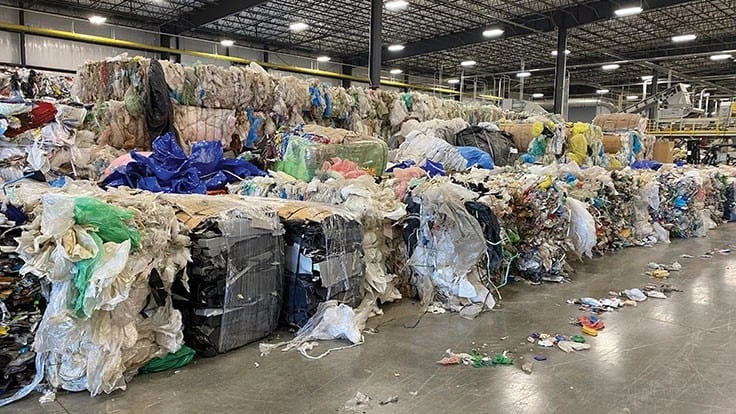
Photo courtesy of Brightmark LLC.
Chemical and other not fully mechanical plastic recycling methods, sometimes referred to by supporters as “advanced recycling,” remains a “highly attractive investment opportunity” for some companies and financiers, according to Netherlands-based Rabobank. Investments are gaining speed in Asia in particular, adds the bank.
Rabobank published a report earlier this year forecasting that by 2025 there could be 140 advanced recycling plants worldwide with a total capacity of up to 4 million metric tons. “Since then, many opponents of advanced recycling [have] raised their voices,” the bank says.
“They argue, for example, that the technology is still unproven and too costly, that it has a worse-than-advertised environmental performance, that there is no traceability in the system and that planned investments are forever being delayed,” continues the European bank.
“Partly in response to the traceability concerns, players are increasing their focus on making advanced recycling supply chains more transparent,” says Susan Hansen, a supply chain global strategist at Rabobank.
The criticism has not stopped positive momentum in the sector. “Even companies under scrutiny have kept announcing new investors, partnerships and ambitious expansion plans, says Rabobank, pointing in part to the increased activity in Asia.
“The critical voices are not the only challenge,” warns Rabobank, adding, “There are many practical, financial, and economic hurdles that the advanced recycling industry needs to deal with in order to become a large-scale and commercially viable industry. Still, it remains a highly attractive investment opportunity for key industry players and investors.”
Hansen says, “During the past six months, plans to build a large number of different types of facilities – including more than 70 additional plants – were announced. And oil companies are also highly active at the moment. Shell just announced its partnership with and acquisition of a 21.5 percent equity share in technology provider BlueAlp.”
Companies in South Korea and Japan have become “exceptionally active in the advanced recycling industry,” according to Rabobank, citing announcements by Mitsui of Japan and SK Geo Centric and Kumho Petrochemical in South Korea. Those firms are forming partnerships with technology companies to jointly explore opportunities for setting up advanced recycling plants.
“The outlook is optimistic in terms of investor interest, yet companies will need to increasingly balance a growing level of criticism and prepare to build more transparent supply chains,” says Hansen. “This is needed to continue to attract financing to scale up technology and roll out facilities.”
A six-page report from Rabobank on the topic can be found on this web page.
Latest from Recycling Today
- BMW Group, Encory launch 'direct recycling’ of batteries
- Loom Carbon, RTI International partner to scale textile recycling technology
- Goodwill Industries of West Michigan, American Glass Mosaics partner to divert glass from landfill
- CARI forms federal advocacy partnership
- Monthly packaging papers shipments down in November
- STEEL Act aims to enhance trade enforcement to prevent dumping of steel in the US
- San Francisco schools introduce compostable lunch trays
- Aduro graduates from Shell GameChanger program





